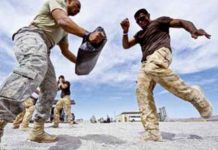“I was parked on a side street writing a report when dispatch gave the neighboring car a call in my district. ‘See the bartender at Keg ‘n More Tavern. Report of a very large, unwanted drunk male assaulting patrons and tearing up the place.’
“I reached for the mic to tell them I’d take it since I’ was clear now and only four blocks away. But something happened that’s never happened before or since: My hand froze when I touched the mike. I couldn’t pick it up.
“At this point in my career, I’d been in dozens of bar fights, but this time I had a weird, powerful feeling that I was going to get hurt, and hurt badly. I just couldn’t get past the thought that the guy was going to attack me and thump me, and that I would be embarrassed in front of my buddies.
“I’m 6-feet, 2 inches tall and weigh 220. I’ve pumped iron since I was a teenager and I’m a self-defense and firearms instructor for the sheriff’s office. I’m always first on the scene and I love a good fight, but this time I just froze.
“My heart was racing as if I’d run a mile and my eyes were watering like crazy. I just sat there, unable to move; I was enveloped in pure, raw fear.
“Dispatch got another car to cover and I prayed the officers wouldn’t drive down the street that I was parked on. What would I say?
“I sat for about ten minutes. I listened as the cars announced their arrival at the tavern, and a few minutes later when they said they had the guy in custody and were going to jail.
“That was ten years ago and this is the first time I’ve ever talked about it.”
–a veteran deputy sheriff ‘s statement during an interview for Deadly Force Encounters: What Cops Need to Know to Mentally and Physically Prepare for and Survive a Gunfight
If you stand back and look at police work objectively, it’s one crazy job. Think about this for a moment: Dispatch tells you there is a guy on the corner of Second and Main waving a gun around and screaming that he is going to shoot the first cop he sees. So what do you do? You roger the call and then you hurry to get there. You hurry to get there! Here is an example.
My partner and I got a call on “a crazy-looking guy,” seen carrying a shotgun on the 15th floor of a high-rise. I had just started to accelerate in that direction when dispatch updated us that he was now in a psychiatrist’s office firing the shotgun, and at least one person was down. As I stomped the throttle even harder, the crazy-looking guy was blasting round after round into the doctor’s face, reloading and then pumping more rounds into his chest.
Three minutes later, we pulled up in front where hundreds of people were screaming, pushing and shoving each other out the glass doors and running in sheer terror left and right down the sidewalk. They had the right idea, but we didn’t have that luxury. In spite of our hammering hearts, churning bowels and weakening legs, we ran against the flow of panic, through the glass doors and up the elevators to the 15th floor.
We actually hurried to get to this horror.
I still remember my mother crying out in disbelief when I told her I had joined the police department, “What? Did I raise you to be a crazy person?” Looks like it, ma.
So why do law enforcement officers hurry to get there in spite of fear raging inside of them? Good question, one that doesn’t have an easy answer since fear is a broad and complex subject that fills volumes. While many psychologists disagree on what causes it and how it affects the human body, most do agree that for law enforcement officers, regular training in police tactics and knowledge of how fear affects the body can help them control it and even use it to their advantage.
Let’s take a brief look at how training can help combat the debilitating affects of fear.
The Importance of Training
It begins with ingraining. From day one, we are taught that our job is to go to where the trouble is, to where angles fear to tread, if you will. We are taught this throughout the academy and it’s reinforced 10-fold when we begin working the street. We learn how to drive to the trouble quickly and safely. We learn where the most strategic place to park is and how to approach the danger on foot. From the very first day, everything we learn is about going to the danger and, after countless repetitions, it becomes ingrained in our brain tissue and it becomes part of our automatic response.
Although we learn some myriad ways to approach the danger, we are never taught even one way to go in the opposite direction.
As always, there are exceptions:
My partner and I arrested a biker inside a biker bar. Agreed, it wasn’t the smart to make the arrest there, and we realized that when it began hailing pool balls, sticks and beer mugs. At one point, as we struggled to hold onto our prisoner, the front door opened and a sergeant, a recent lateral transfer from another agency, stepped in, saw what going on, and quickly backed out.
As an agency policing the largest city in Oregon, we received lots of training on how to handle violent calls, As a result, most of the officers knew what to do and were able to control themselves when the you-know-what “hit the fan.” The sergeant’s old agency, however, rarely dealt with such calls, nor did they get applicable training. As a result, he wasn’t mentally conditioned to hurry to a hot situation and he especially wasn’t mentally prepared to rush through the storm of flying tavern debris to help us. Instead, he yielded to his fear and responded like those frightened citizens fleeing the high-rise. (My understanding of why he didn’t help us didn’t keep me from having a not-so-friendly chat with him later).
Knowledge is power and, as mentioned, the one thing that most psychologists do agree on is that applicable training helps you control your fear and to use the emotion to make you faster, stronger and goal oriented.
Consider the following suggestions.
Stay up-to-date on all police tactics and train regularly on them
Never miss an opportunity to participate in training, especially defensive tactics, shooting, officer survival skills, high-risk traffic stops and so on. If your agency can’t afford to send you, consider paying for the training yourself. Read every training article you can find, buy or borrow pertinent books and videos and don’t be too proud to ask questions of officers more experienced and knowledgeable than you. The more you learn, the better you perform, and do so with reduced fear.
Develop confidence backed by real skill
Insist that your training be as realistic as safety permits. If a defensive tactics technique looks unrealistic to you, politely ask the instructor about it. If a shooting technique lacks real-world practicality, speak up. The more realistic and practical your training, the more confident you are.
Practice mental imagery of high-risk situations at least once a week
Mental imagery is sweatless practice. You can do it in a chair or in your patrol vehicle. In your chair, you can conjure a family fight, an unwanted bar drunk or a mental screaming on a street corner. While you sit there all warm and comfy, see yourself handle the situation smoothly and confidently.
When in your patrol vehicle, park near a mini market, bank or liquor store and visualize how you would respond to a hot robbery in progress. See your actions clearly in your mind and with as many variables as you can create.
Much has been written on the wonders of mental imagery and I encourage you to research it in books, magazines and on the web.
Understand the fight, flight and freeze urges
Fear is not some kind of weird neurosis that needs to be eliminated. It’s an important emotion because it’s Mother Nature’s way of telling all life forms that their lives are in danger and that it’s time to take action. To help them act, fear produces profound chemical changes in their bodies that give them an extra survival edge by compelling them to instinctively, and without hesitation, do one of three things to save their lives: fight, freeze or take flight.
Fight
When we are fighting for our lives, Mother Nature doesn’t expect us to fight by the rules; she has programmed us to annihilate the threat any way we can. When faced with a life threatening event, many people find a strength and ferocity they never knew they had. Even small, timid animals can be provoked into all-out attacks when they find themselves cornered.
As an officer, you can fight hard and even use deadly force, but you must do so with control, both of the situation and of yourself. This is not an easy task when someone is trying to kill you.
Flight
We knew how to take flight when we were kids and that noise in the dark made our hearts slam into our throats. We crashed through bushes and fences, heedless of scratches and bruises, and we didn’t stop until we got home panting and shaken. No one taught that to us; we knew it instinctively from day one.
Flight (tactical retreats and taking cover are not considered a flight response) is not an option for you as a law enforcement officer. You get the big bucks to go where the danger is.
Freeze
When we can’t do the first two, Mother Nature gave us a third way to survive. For example, when a grizzly bear charges us, fighting is not an option, nor is flight, since he can run faster than us. Park Rangers advise us to freeze and play dead, so that the bear will get bored and go look for livelier prey.
Unless you work around wild animals as an officer, freezing is rarely a good survival option.
Based on these powerful instinctive urges to fight like an animal, run like a Cheetah, or freeze in place, you have a difficult task as an officer. The nature of the job places you in situations where you not only have to contend with life-threatening danger, but you also have to control the fight, flight or freeze urges. This will be much easier to do when you understand what they are all about and realize that they exist in everyone.
Understand and accept the possibility that you may have to use deadly force
How many times have you heard an officer say this? “Yeah, I could kill someone if the guy was trying to kill me.” If you have said this, it’s important that you go beyond the cliche statement and really considered what it would be like to pump bullets into a person’s body, to see that person crumple to the ground as a result of what you did.
It’s imperative that you think profoundly about it and visualize scenarios that lead up to it, scenarios that depict the exact moment deadly force is used and scenarios of the critical moments after the shooting, such as when you would call for back-up, order an ambulance, deal with additional threats, crowds, and so on.
The more mentally “rehearsed” you are for a deadly force encounter, the greater the chance you have of controlling yourself and all your emotions when in a real situation.
Review past high-risk situations as to what was done well and what needs improvement
The best partner is one with which you can have post-incident discussions and be free to be critical of yourselves and of each other. If you don’t work with a partner, analyze yourself as to how you handled the incident. Swallow your pride and discuss your actions with another officer over coffee. Understand that just because you did something that worked, there may be other options that would have worked even better. Reviewing your actions is a powerful device to learn from, one that gives you confidence as you hurry to your next hot incident.
Constantly strive to be alert and aware
Your constant alertness and awareness are important because they reduce and even eliminate your getting taken by surprise. When you are suddenly thrust into a hot situation but your head is in the White Zone thinking about next weekend’s fishing trip, there is an increased chance that your mind, startled and unable to catch up with what is happening, will freeze. Being alert and aware keep you focused on the job, even during those long stretches of boredom.
Trust your intuition
The root of the word intuition, tuere, means “to guard, to protect.” You want to trust your intuition because it’s an accumulation of knowledge from your life experiences that is working for you at the speed of light. Author Gavin De Becker says in his wonderful book, The Gift of Fear, “We think conscious thought is somehow better, when in fact, intuition is soaring flight compared to the plodding of logic. Nature’s greatest accomplishment, the human brain, is never more efficient or invested than when its host is at risk.”
Develop a powerful will to survive no matter what the situation
Perhaps you have heard the stories of police officers dying from nonfatal gunshot wounds. Their shock and fear at being shot (the many psychological ramifications are beyond the scope of this article) caused them to die. On the flip side, you have also heard of officers severely wounded who nonetheless continued to fight and to direct in back-up officers to the scene. These officers had a powerful will to survive, and survive they did in spite of, in some cases, being riddled with bullets.
Spend your alone time telling yourself that you will survive no matter how injured you are, and that you will keep fighting and not give up until you have won.
Maintain a high level of physical fitness
All those hyper magazine ads for protein powders and weight training courses have one semblance of truth: Being fit does increase your confidence, but not just for the opposite sex. The better your aerobic fitness and the greater your physical strength, the more self-understanding you have, and the more likely you can control any instinctual urges that try to influence your performance.
Be knowledgeable of crime trends and criminals in your city, your precinct, and your beat
The concept here is similar to the importance of your being alert and aware. The more in tune you are with what is going on around you, the less likely you will be taken by surprise. Knowledge is power and knowledge reduces fear.
Understand and accept the affects of fear
Don’t think of fear as negative, but as a positive warning device that keeps you alert and prepares you to survive. Controlled fear makes you fast, strong, impervious to pain and mentally sharp.
Fear induced fight, flight and freeze are left over from our cave dwelling ancestors. If they hadn’t had them, man would have been extinct eons ago. In your job as a law enforcement officer, you don’t have the luxury of allowing yourself to yield to these urges as Mother Nature would like you to. Always keep in mind that the better trained you are in the many aspects of your job and the more knowledge you have about fear, the more control you will have over them.










